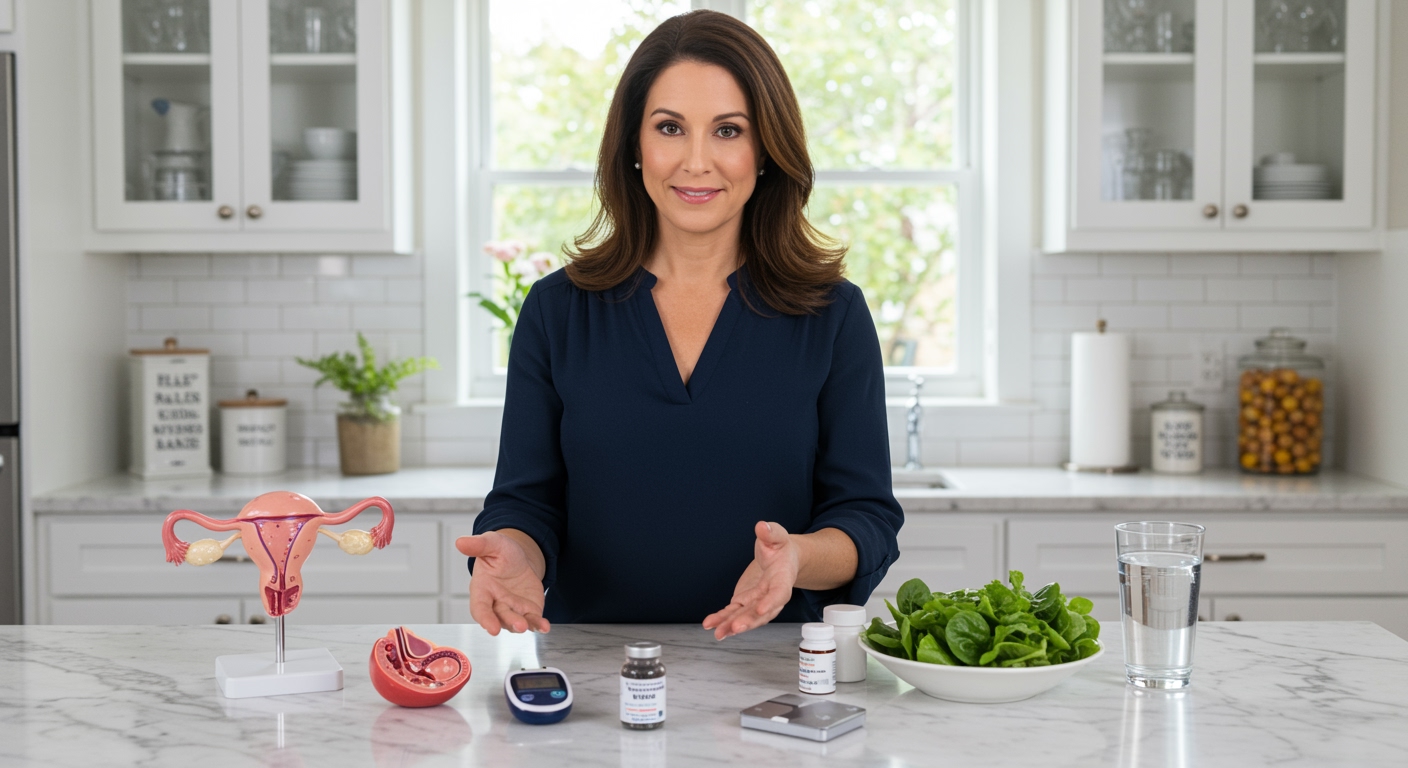✪ Key Takeaway: Vanadium may improve insulin sensitivity in PCOS, but evidence remains limited and safety concerns exist.
Introduction
You hear about vanadium supplements promising to fix your PCOS insulin resistance overnight.
Maybe you are wondering if this trace mineral could be the missing piece in your PCOS puzzle, especially when metformin makes you feel sick or when your blood sugar stays stubborn despite your best efforts.
Hi, I am Abdur, your nutrition coach and today I am going to explain whether vanadium can truly help with PCOS and what the science actually shows.
What Is Vanadium And How Does It Work?
Vanadium is a trace mineral that your body needs in extremely small amounts.
You get tiny amounts from foods like mushrooms, shellfish, and whole grains, but most people consume less than 2 micrograms daily.
This mineral works by mimicking insulin in your cells, which means it can help glucose enter your cells without requiring as much natural insulin.
Scientists call this an insulin-sensitizing effect, which sounds perfect for PCOS since insulin resistance drives many symptoms.
Vanadium activates specific enzymes in your muscle and fat cells that normally respond to insulin signals.
When these enzymes work better, your cells can take up glucose more efficiently, potentially lowering your blood sugar levels.
✪ Fact: Vanadium compounds were first studied as diabetes treatments in the early 1900s before insulin was discovered.
Does Research Support Vanadium For PCOS?
The research on vanadium for PCOS is surprisingly limited despite the theoretical benefits.
Most studies focus on type 2 diabetes rather than PCOS specifically, which creates a knowledge gap.
Early diabetes studies showed that vanadium supplements could lower fasting blood glucose by 10-20% in some people.
However, these improvements often disappeared when people stopped taking the supplements, suggesting the effects are temporary.
One small study found that vanadium improved insulin sensitivity in people with metabolic syndrome, but the participants experienced significant side effects.
The problem is that effective doses for blood sugar control often cause digestive upset, fatigue, and other unpleasant symptoms.
No large-scale studies have specifically tested vanadium supplements in women with PCOS, which means we are extrapolating from diabetes research.
✪ Note: Most vanadium research uses doses 50-100 times higher than what you get from food sources.
What Are The Safety Concerns With Vanadium?
Safety concerns with vanadium supplements are more serious than many people realize.
Your body has no established mechanism to excrete excess vanadium, which means it can accumulate in your tissues over time.
High doses can cause kidney damage, liver problems, and interference with other essential minerals like iron and zinc.
Common side effects include nausea, diarrhea, stomach cramps, and a green tongue that indicates vanadium toxicity.
The therapeutic window between an effective dose and a toxic dose is extremely narrow with vanadium.
Animal studies show that chronic vanadium exposure can affect reproductive function, which is particularly concerning for women with PCOS who are trying to conceive.
Most health authorities recommend against vanadium supplementation except under strict medical supervision.
✪ Pro Tip: If you experience a metallic taste or green discoloration of your tongue, stop vanadium supplements immediately.
Are There Better Alternatives For PCOS?
Several safer alternatives can improve insulin sensitivity in PCOS without the risks associated with vanadium.
Chromium picolinate has much stronger research support for blood sugar control and is generally well-tolerated at recommended doses.
Inositol supplements, particularly myo-inositol, have extensive research showing benefits for PCOS insulin resistance and ovulation.
Berberine works similarly to metformin but comes from natural plant sources and has fewer side effects for most people.
Alpha-lipoic acid can improve insulin sensitivity while providing antioxidant protection against PCOS-related inflammation.
Lifestyle interventions like resistance training and low-glycemic eating patterns remain the most effective long-term strategies for managing PCOS insulin resistance.
These alternatives have better safety profiles and more robust research specifically in women with PCOS.
✪ Fact: Inositol supplements show improvement in 70-80% of women with PCOS in clinical studies.
The Bottom Line
While vanadium might theoretically help with PCOS insulin resistance, the current evidence does not support its use as a safe or effective treatment option.
The risk-to-benefit ratio simply does not add up when safer, better-researched alternatives exist for managing PCOS.
I would love to hear about your experiences with PCOS supplements or any questions you might have about managing insulin resistance naturally in the comments below.
References
At NutritionCrown, we use quality and credible sources to ensure our content is accurate and trustworthy. Below are the sources referenced in writing this article:
- PubMed: Vanadium and diabetes
- PMC: Trace elements in PCOS
- Drugs.com: Vanadium supplement information
- Frontiers in Endocrinology: PCOS and insulin resistance
- WebMD: Vanadium uses and side effects





